八年级下Unit 1
最全面人教版八年级下册英语第一单元知识点归纳总结

Unit 1 What's the matter?一、词汇与短语◆重点单词A部分1.matter n. 问题;事情2.sore adj. 疼痛的;酸痛的3.stomachache n. 胃痛;腹痛4.foot n. 脚;足5.neck n. 颈;脖子6.stomach n. 胃;腹部7.throat n. 咽喉;喉咙8.hurt v. (使)疼痛;受伤9.fever n. 发烧10.passenger n. 乘客;旅客11.lie v. 躺;平躺12.break n. 间歇;休息13.rest v. &n. 放松;休息14.onto prep. 向;朝15.X-ray n. X射线;X光16.trouble n. 问题;苦恼17.toothache n. 牙痛18.hit n. (用手或器具)击;打19.headache n. 头痛20.herself pron. (she的反身代词)她自己21.off adv. & prep. 离开(某处);不工作;从……去掉B部分1.bandage n. 绷带v. 用绷带包扎2.press v. 压;挤;按3.sick adj. 生病的;有病的4.knee n. 膝;膝盖5.breathe v. 呼吸6.knife n. 刀7.sunburned adj. 晒伤的8.blood n. 血9.ourselves pron. (we反身代词)我们自己10.mean v. 意思是;打算11.climber n. 登山者;攀登者12.importance n. 重要性;重要13.risk n.&v. 危险;风险;冒险14.decision n. 决定;抉择15.accident n.(交通)事故;意外遭遇16.control v.&n. 限制;约束;管理17.situation n. 情况;状况18.spirit n. 勇气;意志19.kilo( = kilogram) n. 千克;公斤20.death n. 死;死亡21.rock n. 岩石22.nurse n. 护士◆重点短语A部分1.have a cold 感冒2.lie down 躺下3.have a stomachache 胃痛4.take one's temperature 量体温5.have a fever 发烧6.to one's surprise 使……惊讶的是7.get off 下车8.right away 立即;马上9.take breaks (take a break) 休息10.talk too much 说得太多11.drink enough water 喝足够的水12.have a very sore throat 嗓子非常疼13.get an X-ray 拍X光片14.see a dentist 看牙医15.drink some hot tea with honey 喝一些加蜂蜜的热茶16.put some medicine on sth.在……上面敷一些药17.feel very hot 感到很热18.sound like 听起来像19.all weekend 整个周末20.in the same way 以同样的方式21.go to a doctor 看医生22.go along 沿着……走23.on the side of the road 在马路边24.shout for help 大声呼救25.without thinking twice 没有多想26.have a heart problem 有心脏病27.thanks to 多亏了;由于28.in time 及时29.save a life 挽救生命30.get into trouble 陷入麻烦31.hurt oneself 受伤32.fall down落下;摔倒B部分1.be used to 习惯于……;适应于……2.in a difficult situation 在困境中3.take risks (take a risk) 冒险4.keep on doing sth. 继续(或坚持)做某事5.run out (of) 用尽;耗尽6.make a decision 作出决定7.cut off 切除8.get hit on the head 撞到头部9.get out of 离开;从……岀来10.be interested in 对……感兴趣11.give up 放弃12.mean doing sth. 意味着做某事13.put a bandage on sth. 用绷带包扎…14.lose one's life 失去生命15.feel sick 感到恶心16.mountain climbing 登山运动17.have problems breathing 呼吸困难18.be in control of 掌管;管理◆重点句子A部分1.What's the matter with you?=What's the trouble with you?=What's wrong with you?你怎么了?2.What should she do? 她该怎么办呢?3.Did you fall down? 你跌倒了吗?4.Should I take my temperature? 我应该量一下体温吗?5.I think I sat in the same way for too long without moving.我想我以同样的姿势一动不动地坐得太久了。
八年级英语(下册)Unit1 What’s the matter单元语言点讲解和训练

一.短语归纳1.too much 太多2.lie down 躺下3.get an X-ray 做个X光检查4.take one ’s temperature 量体温5.put some medicine on ......在....上敷药5.have a fever 发烧7.take breaks /take a break 休息8.without thinking twice 没多想9.get off 下车9.take sb to the hospital 送某人去医院11.wait for等待12.to one’s surprise 使.......惊讶的13.thanks to多亏于;由于14. in time及时15.think about 考虑16.have a heart problem患有心脏病17.get into the trouble 遇到麻烦18.do the right thing做正确的事情事情19.fall down 摔倒20.put ...... on sth把...放在某物上21.get hit/sunburned 摔伤/烧伤22.be interested in 对.....感兴趣23.be used to 习惯于....24.take risks/take a risk 挑战25.lose one’s life 失去生命26.because of 因为27.run out of 用完28.cut off 切除29.get out of 从...出来30.make a decision/decisions 做决定31.be in control of 掌管;管理32.give up 放弃㈡用法归纳:1.need to do sth .需要去做某事2.see sb doing sth 看见某人正在做某事3.ask sb sth 询问某人某事4.expect sb to do sth 期望某人做某事5.agree to do sth 同意做某事6.help sb (to) do sth 帮助某人做某事7.want to do sth 想要做某事 8.tell sb to do sth 告诉某人做某事9.have problems(in) doing sth 做某事有困难 e sth to do sth用某物去做某事11.be/get used to doing sth 习惯于做某事12.seem to do sth 好像做某事13.keep on doing sth 继续做某事14.mind doing sth 介意做某事㈢语法点:1.询问某人的健康问题及遇到麻烦的表达方法。
人教版英语八年级下册unit1单元知识点归纳总结
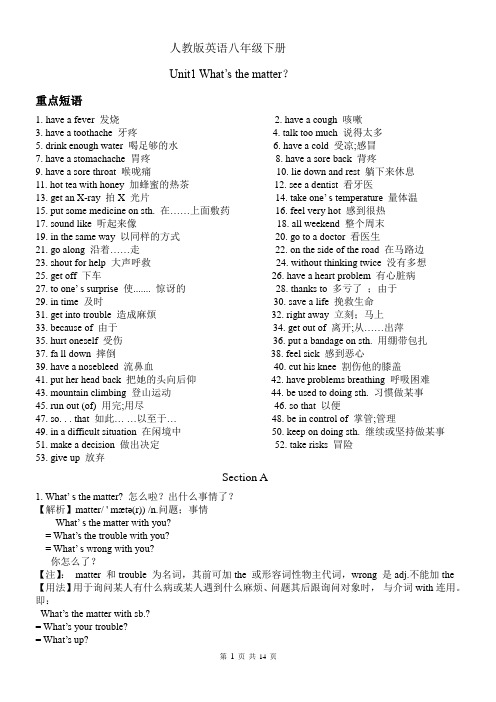
人教版英语八年级下册Unit1 What’s the matter?重点短语1.have a fever 发烧2. have a cough 咳嗽3. have a toothache 牙疼4. talk too much 说得太多5. drink enough water 喝足够的水6. have a cold 受凉;感冒7. have a stomachache 胃疼8. have a sore back 背疼9. have a sore throat 喉咙痛10. lie down and rest 躺下来休息11. hot tea with honey 加蜂蜜的热茶12. see a dentist 看牙医13. get an X-ray 拍X 光片14. take one’ s temperature 量体温15. put some medicine on sth. 在……上面敷药16. feel very hot 感到很热17. sound like 听起来像18. all weekend 整个周末19. in the same way 以同样的方式20. go to a doctor 看医生21. go along 沿着……走22. on the side of the road 在马路边23. shout for help 大声呼救24. without thinking twice 没有多想25. get off 下车26. have a heart problem 有心脏病27. to one’ s surprise 使....... 惊讶的28. thanks to 多亏了;由于29. in time 及时30. save a life 挽救生命31. get into trouble 造成麻烦32. right away 立刻;马上33. because of 由于34. get out of 离开;从……出萍35. hurt oneself 受伤36. put a bandage on sth. 用绷带包扎37. fa ll down 摔倒38. feel sick 感到恶心39. have a nosebleed 流鼻血40. cut his knee 割伤他的膝盖41. put her head back 把她的头向后仰42. have problems breathing 呼吸困难43. mountain climbing 登山运动44. be used to doing sth. 习惯做某事45. run out (of) 用完;用尽46. so that 以便47. so. . . that 如此… …以至于…48. be in control of 掌管;管理49. in a difficult situation 在闲境中50. keep on doing sth. 继续或坚持做某事51. make a decision 做出决定52. take risks 冒险53. give up 放弃Section A1. What’ s the matter? 怎么啦?出什么事情了?【解析】matter/ ' mætə(r)) /n.问题;事情What’ s the matter with you?= What’s the trouble with you?= What’ s wrong with you?你怎么了?【注】:matter 和trouble 为名词,其前可加the 或形容词性物主代词,wrong 是adj.不能加the 【用法】用于询问某人有什么病或某人遇到什么麻烦、问题其后跟询问对象时,与介词with连用。
初中英语八年级下册Unit 1(含答案解析)

一、选择题1.You should ______ more water when you have a fever.A.drinks B.drinking C.drink D.has C解析:C【解析】句意:你发烧时应该多喝水。
情态动词should后跟动词原形,故答案为C。
2.I couldn't believe that such an expensive car was________and crashed into another car. A.without controlling B.out of control C.under the control B解析:B【解析】句意:我真不敢相信这样一辆昂贵的汽车失控了,撞上了另一辆车。
考查介词短语辨析题。
A. without controlling没有控制;B. out of control失去控制;C. under the control在控制下。
根据句意结构,可知out of control最合语境,故选B。
3.What’s the matter ____ you?—My back hurts.A.with B.for C.at D.on A解析:A【解析】句意:你怎么了?-我背痛。
A. with对于,和,具有;B. for为了,给; C. at 在;D. on在…上,关于,接通。
句型What’s the matter?:什么事,怎么了,问某人怎么了,出了什么事,用with sb.;故选A。
4.You should ____ more water when you have a fever.A.drinks B.drinking C.drinked D.have D解析:D【解析】句意:你发烧的时候应该多喝水。
Should:应该,情态动词,后面跟动词原形;故选D。
5.He’s ill. He must go to ____ a doctor in the hospital.A.look B.watch C.see D.visited C解析:C【解析】句意:他病了。
人教版英语八年级下册单元Unit 1 知识点+测试卷+思维导图

Unit 1 What’s the matter?1.重点词汇:foot, knee, neck, stomach, throat, matter, cough, fever, headache, stomachache, toothache, nurse, blood, rest, X-ray, situation, spirit, trouble, death, hit, hurt, lie ...2. 短语归纳:1. have a cold 感冒2. have a stomachache 胃痛3. lie down 躺下4. take one’s temperature 量体温5. have a fever 发烧6. take breaks (take a break) 休息7. get off 下车8. to one’s surprise 使……惊讶的;出乎……意料9. right away 立即,马上10. get into陷入;参加11. be used to习惯于……;适应于……12. take risks (take a risk) 冒险13. run out (of) 用尽,耗尽14. get out of离开;从……出来15. be in control of 掌管;管理16. give up放弃3. 必背典句:1. -What’s the matter? -I have a stomachache.-你怎么了?-我胃痛。
2. -What’s the matter with Ben? -He hurt himself.-本怎么了?-他弄伤了自己。
3. -Does he have a toothache? -Yes, he does.-他牙疼吗?-是的,他牙疼。
4. -What should she do? -She should take her temperature.-她应该做什么?-她应该量体温。
人教版新版八年级英语下册Unit1 知识要点
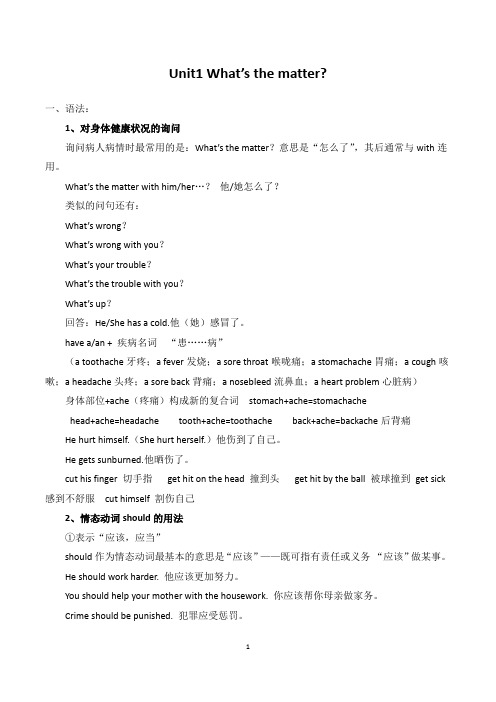
Unit1 What’s the matter?一、语法:1、对身体健康状况的询问询问病人病情时最常用的是:What’s the matter?意思是“怎么了”,其后通常与with连用。
What’s the matter with him/her…?他/她怎么了?类似的问句还有:What’s wrong?What’s wrong with you?What’s your trouble?What’s the trouble with you?What’s up?回答:He/She has a cold.他(她)感冒了。
have a/an + 疾病名词“患……病”(a toothache牙疼;a fever发烧;a sore throat喉咙痛;a stomachache胃痛;a cough咳嗽;a headache头疼;a sore back背痛;a nosebleed流鼻血;a heart problem心脏病)身体部位+ache(疼痛)构成新的复合词stomach+ache=stomachachehead+ache=headache tooth+ache=toothache back+ache=backache后背痛He hurt himself.(She hurt herself.)他伤到了自己。
He gets sunburned.他晒伤了。
cut his finger 切手指get hit on the head 撞到头get hit by the ball 被球撞到get sick 感到不舒服cut himself 割伤自己2、情态动词should的用法①表示“应该,应当”should作为情态动词最基本的意思是“应该”——既可指有责任或义务“应该”做某事。
He should work harder. 他应该更加努力。
You should help your mother with the housework. 你应该帮你母亲做家务。
八年级英语下册 Unit1 核心词汇

八年级英语下册Unit1核心词汇教材核心词汇知识链接及典例解读一、used to曾经教材原句You used to share food with me!你过去常与我分享食物!背例句学搭配His parents used to live in the countryside.他的父母过去住在乡下。
固定搭配used to do sth. 意为“过去经常做某事,以前常常做某事”,表示过去的习惯。
本身已是过去时态,没有人称和数的变化,暗含现在已不再如此。
易混辨析be used to doing sth.习惯于做某事My father is used to reading newspapers after dinner.我父亲习惯晚饭后读报。
be used to do 被用来做……A pen is used to write with.笔是用来写的。
典例解读1.My father _____________in a small village when he was a small child.A.used to living B.was used to liveC.used to live D.use to live【答案】C【解析】句意:我父亲小时候住在一个小村庄。
be used to doing sth.习惯于做某事,used to do sth.过去常常做某事,固定搭配。
根据时间状语从句when he was a small child可知,此处是“我父亲过去常常住在一个小村庄。
故选C。
2.My father _______ working on the farm, but he is a driver now.A.is used to B.was used to C.used to D.gets used to【答案】B【解析】句意:我父亲过去在农场工作,但他现在是一名司机。
根据but he is a driver now 可知,前面应该是表示过去发生的事情,排除A和D;be used to doing sth.习惯于做某事,used to do sth.过去常常做某事,固定搭配。
人教版英语八年级下unit1讲解与练习
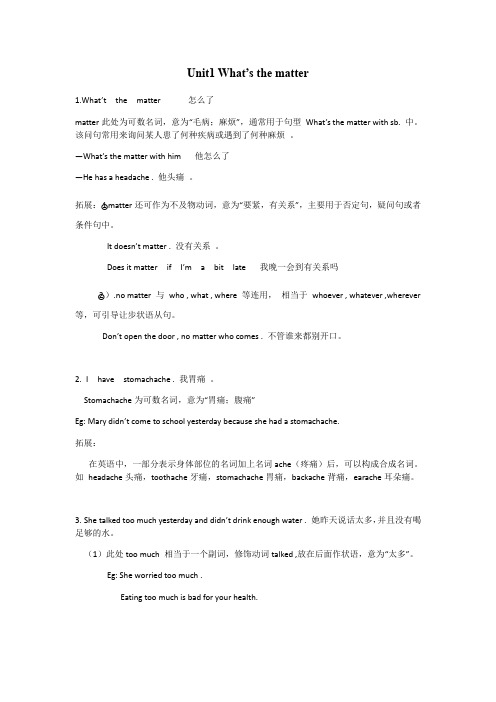
Unit1 What’s the matter1.What’t the matter 怎么了matter此处为可数名词,意为“毛病;麻烦”,通常用于句型What’s the matter with sb. 中。
该问句常用来询问某人患了何种疾病或遇到了何种麻烦。
—What’s the matter with him 他怎么了—He has a headache . 他头痛。
拓展:○1matter还可作为不及物动词,意为“要紧,有关系”,主要用于否定句,疑问句或者条件句中。
It doesn’t matter . 没有关系。
Does it matter if I’m a bit late 我晚一会到有关系吗○2).no matter 与who , what , where 等连用,相当于whoever , whatever ,wherever 等,可引导让步状语从句。
Don’t open the door , no matter who co mes . 不管谁来都别开口。
2. I have stomachache . 我胃痛。
Stomachache为可数名词,意为“胃痛;腹痛”Eg: Mary didn’t come to school yesterday because she had a stomachache.拓展:在英语中,一部分表示身体部位的名词加上名词ache(疼痛)后,可以构成合成名词。
如headache头痛,toothache牙痛,stomachache胃痛,backache背痛,earache耳朵痛。
3.She talked too much yesterday and didn’t drink enough water . 她昨天说话太多,并且没有喝足够的水。
(1)此处too much 相当于一个副词,修饰动词talked ,放在后面作状语,意为“太多”。
Eg: She worried too much .Eating too much is bad for your health.(2)此处enough为形容词,意为“足够的”。
(完整版)Unit1人教版八年级英语下册语法与知识点,推荐文档

Unit 1第一部分:Grammar一、情态动词(Modal Verbs)情态动词should 意为“应该,应当”,必须和后面的动词原形一起构成谓语,没有人称和数的变化。
用以表达职责和义务、提出劝告,而且表述的是自己的主观看法。
注意:should 在以why,who,how 等疑问词开头的问句中,意为“竟然,居然,怎么会”,表示意外、惊喜或在说话人看来是不可思议的。
三、反身代词表示反射或强调的代词叫做反身代词。
反身代词是由第一人称、第二人称形容词性物主代词或第三人称代词的宾格形式,词尾加self 或selves 组成。
反身代词可译“本人”、“本身”,为加强语气,也常翻译为“亲自”、“自己”。
不定人称代词one ---- o neself.第二部分:单词用法Section A1.What’s the matter?怎么了?该句常用询问某人患了何种疾病或遇到了什么麻烦,其后用with 引出对象。
1). What’s the matter with sb.?=what’s wrong with sb.?=what’s the trouble/problem with sb.?=what’s one’s trouble/problem?e.g. What’s the matter w ith Tom?=what’s with Tom?=What’s the with Tom?=What’s Tom’s?2). matter, 名词,“问题,事情”e.g. We have important (matter) to discuss.我们有些重要的问题要讨论。
3). 动词,“要紧,关系重大”e.g. It dosen’t that you came late.2.I have a cold. 我感冒了。
1).have/get/catch a cold “感冒,着凉”The old man a cold yesterday.那位老人昨天感冒了。
人教版英语八年级下册Unit1 知识点精讲
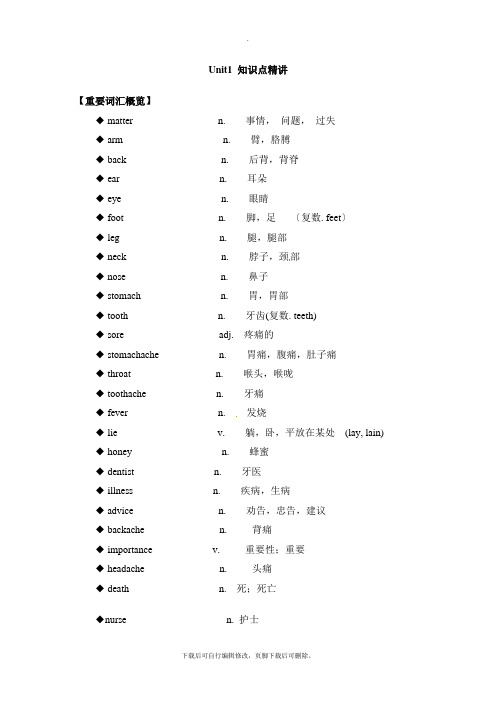
Unit1 知识点精讲【重要词汇概览】◆ matter n.事情,问题,过失◆ arm n.臂,胳膊◆ back n.后背,背脊◆ ear n.耳朵◆ eye n.眼睛◆ foot n.脚,足〔复数. feet〕◆ leg n.腿,腿部◆ neck n.脖子,颈部◆ nose n.鼻子◆ stomach n.胃,胃部◆ tooth n.牙齿(复数. teeth)◆ sore adj.疼痛的◆ stomachache n.胃痛,腹痛,肚子痛◆ throat n.喉头,喉咙◆ toothache n.牙痛◆ fever n.发烧◆ lie v.躺,卧,平放在某处(lay, lain)◆ honey n.蜂蜜◆ dentist n.牙医◆ illness n.疾病,生病◆ advice n.劝告,忠告,建议◆ backache n.背痛◆ importance v. 重要性;重要◆ headache n. 头痛◆ death n. 死;死亡◆nurse n. 护士◆ knife n. (复数.knives)刀【重要词组概览】◆ have a cold患感冒◆ take breaks(take a break) 休息◆ lie down 躺下◆ get off 下车◆ be used to 习惯于...;适应于...◆ on the other hand另一方面◆ get a cold患感冒◆ see a dentist看牙医◆take one’s temperature 量体温◆ make sb sick使某人不舒服(患锁病)◆ have a sore throat嗓子痛◆ have a fever发烧,发热◆ have a toothache牙痛◆ have a backache背痛◆ have a headache头痛◆give up 放弃◆cut off 切除◆get out 〔of〕用尽;耗尽◆take risks〔take a risk〕冒险◆get into 陷入;参与◆right away 立即;马上◆to one’s s urprise 使...惊讶的;出乎...意料【语法知识聚焦】看病需要和医生交流,这是英语口语中必不可少的内容。
人教版八年级英语下册 Unit1 知识点讲解
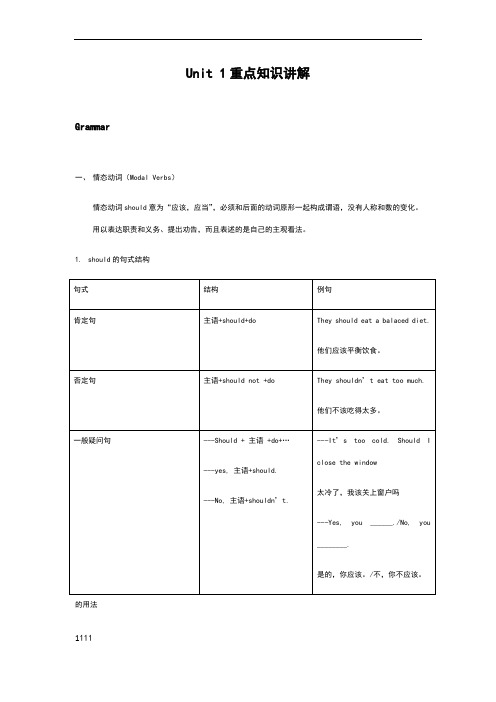
Unit 1重点知识讲解Grammar一、情态动词(Modal Verbs)情态动词should意为“应该,应当”,必须和后面的动词原形一起构成谓语,没有人称和数的变化。
用以表达职责和义务、提出劝告,而且表述的是自己的主观看法。
1.should的句式结构的用法注意:should在以why,who,how等疑问词开头的问句中,意为“竟然,居然,怎么会”,表示意外、惊喜或在说话人看来是不可思议的。
二、其他表示建议的句型三、反身代词表示反射或强调的代词叫做反身代词。
反身代词是由第一人称、第二人称形容词性物主代词或第三人称代词的宾格形式,词尾加self或selves组成。
反身代词可译“本人”、“本身”,为加强语气,也常翻译为“亲自”、“自己”。
不定人称代词one-----oneself.1、反身代词的分类2、反身代词的用法单词的用法Section A1.What’s the matter怎么了该句常用询问某人患了何种疾病或遇到了什么麻烦,其后用with引出对象。
1). What’s the matter with sb.=what’s wrong with sb.=what’s the trouble/problem with sb.=what’s one’s trouble/problem. What’s the matter with Tom=what’s _________ with Tom=What’s the _________ with Tom=What’s Tom’s _________2). matter, 名词,“问题,事情”. We have important _________(matter) to discuss.我们有些重要的问题要讨论。
3). 动词,“要紧,关系重大”. It dosen’t _________ that you came late.2.I have a cold.我感冒了。
Unit1教案及练习--八年级英语下册

八年级下unit1教案及练习Unit 1 Helping those in need知识清单一、词形转换1. disabled adj.残疾的disability n.残疾2. organize v.组织organization n.组织3. express v.表达;表露expression n.表达;表情expressive adj.富于表情的4. serious adj.严重的seriously adv.严重地5. ill adj.有病的illness n.疾病6. permit v.允许permission n.准许;批准7. pain n.痛苦;苦恼painful adj.痛苦的painless adj.无痛的8. joy n.愉快;喜悦joyful adj.愉快的9. peace n.平静;宁静peaceful adj.和平的;安静的peacefully adv.和平地;安静地10. courage n.勇气;勇敢encourage v.鼓励11. voluntary adj.义务的volunteer n.志愿者12. alone adj.独自的;单独的adv.独自地1. ask permission to do sth.报请批准做某事2. raise money for 为...筹钱3. give sb. a hand给某人帮个忙4. offer to do sth.主动提出做某事5. in a children's hospital在一家儿童医院6. suffer from因...受苦;受折磨7. serious illnesses严重疾病10. spend time with sb.与某人共度时光11. bring joy and peace带来快乐与平静12. raise one's spirits使振奋;使鼓起勇气13. feel lonely感到孤独14. a person with courage一个有勇气的人15. return to sp.回到某地16.attend classes上课8. a painting competition .一次绘画比赛9. tell stories讲故事17. in order to / so as to为了....18. do some voluntary work 做一些志愿者工作1. Three teenagers offer to do some voluntary work during the school holidays.三名青少年主动提出在学校假期期间去做义工。
Unit1词汇,短语,语法归纳人教版八年级英语下册

八下 unit 1 语法归纳总结询问某人的健康问题及遇到事情麻烦等常用的表达方式1 What's the matter (with xx)?(某人)怎么了?2 What's wrong (with xx)?(某人)怎么了?3 What's the trouble (with xx)?(某人)怎么了?4 What happened (to xx)?(某人)发生了什么事?5 Are you OK? 你没事吧?6 Is there anything wrong with xx? 某人有什么事吗?练一练: What's the matter with your leg? ﹦________ ________ ________ ________ __________?﹦________ ________ ________ ________ __________?表达身体疼痛或不舒服,可用如下结构1. sb + have/ has + 病症Eg: Sb has/ have a cold/ bad cold/ cough/ fever/ temperature/ nosebleed某人有感冒,重感冒,咳嗽,发烧,出鼻血2.sb + has/have + a + 身体部位 + acheEg: Sb has/have a headache / toothache/ earache/ backache/ heartache/ stomachache 某人头痛,牙痛,耳朵疼,后背痛,心痛,胃痛3. sb + has/ have + a sore +发病部位Eg: Sb has/have a sore throat/ eye/ back/ arm某人嗓子疼,眼睛疼,后背疼,胳膊疼4. sb + has/have a pain (pains) in one's + 身体部位Eg:Sb has/have a pain in sb's head/ neck 某人头痛,脖子痛5. sb的某部位 + hurt(hurts)注:hurt的过去式,过去分词还是hurteg: My head hurts. 我头痛 His legs hurts。
(完整版)人教版八年级英语下册Unit1知识点讲解(可编辑修改word版)

Unit 1 重点知识讲解Grammar一、情态动词(Modal Verbs)情态动词should 意为“应该,应当”,必须和后面的动词原形一起构成谓语,没有人称和数的变化。
用以表达职责和义务、提出劝告,而且表述的是自己的主观看法。
1.should 的句式结构2.s hould 的用法喜或在说话人看来是不可思议的。
二、其他表示建议的句型表示反射或强调的代词叫做反身代词。
反身代词是由第一人称、第二人称形容词性物主代词或第三人称代词的宾格形式,词尾加self 或selves 组成。
反身代词可译“本人”、“本身”,为加强语气,也常翻译为“亲自”、“自己”。
不定人称代词one ---- oneself.1、反身代词的分类2、反身代词的用法单词的用法Section A1.What’s the matter?怎么了?该句常用询问某人患了何种疾病或遇到了什么麻烦,其后用with 引出对象。
1). What’s the matter with sb.?=what’s wrong with sb.?=what’s the trouble/problem with sb.?=what’s one’s trouble/problem?e.g. What’s the matter with Tom?=what’s with Tom?=What’s the with Tom?=What’s Tom’s?2). matter, 名词,“问题,事情”e.g. We have important (matter) to discuss.我们有些重要的问题要讨论。
3). 动词,“要紧,关系重大”e.g. It dosen’t that you came late.2.I have a cold.我感冒了。
1).have/get/catch a cold “感冒,着凉”The old man a cold yesterday.那位老人昨天感冒了。
人教版英语八年级下册第一单元Unit 1知识点
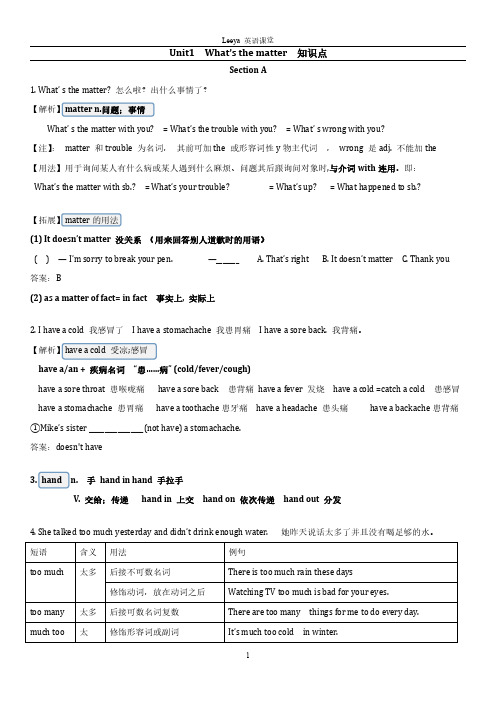
Unit1What’s the matter知识点Section A1.What’s the matter?怎么啦?出什么事情了?【解析】matter n.问题;事情What’s the matter with you?=What’s the trouble with you?=What’s wrong with you?【注】:matter和trouble为名词,其前可加the或形容词性y物主代词,wrong是adj.不能加the【用法】用于询问某人有什么病或某人遇到什么麻烦、问题其后跟询问对象时,与介词with连用。
即:What’s the matter with sb.?=What’s your trouble?=What’s up?=What happened to sb.?【拓展】matter的用法(1)It doesn’t matter没关系(用来回答别人道歉时的用语)()—I’m sorry to break your pen.—_______ A.That’s right B.It doesn’t matter C.Thank you 答案:B(2)as a matter of fact=in fact事实上,实际上2.I have a cold我感冒了I have a stomachache我患胃痛I have a sore back.我背痛。
【解析】have a cold受凉;感冒have a/an+疾病名词“患……病”(cold/fever/cough)have a sore throat患喉咙痛have a sore back患背痛have a fever发烧have a cold=catch a cold患感冒have a stomachache患胃痛have a toothache患牙痛have a headache患头痛have a backache患背痛①Mike’s sister_________________(not have)a stomachache.答案:doesn't have3.hand n.手hand in hand手拉手V.交给;传递hand in上交hand on依次传递hand out分发4.She talked too much yesterday and didn’t drink enough water.她昨天说话太多了并且没有喝足够的水。
人教版丨八年级下册Unit1单词,知识梳理,词汇句式精讲
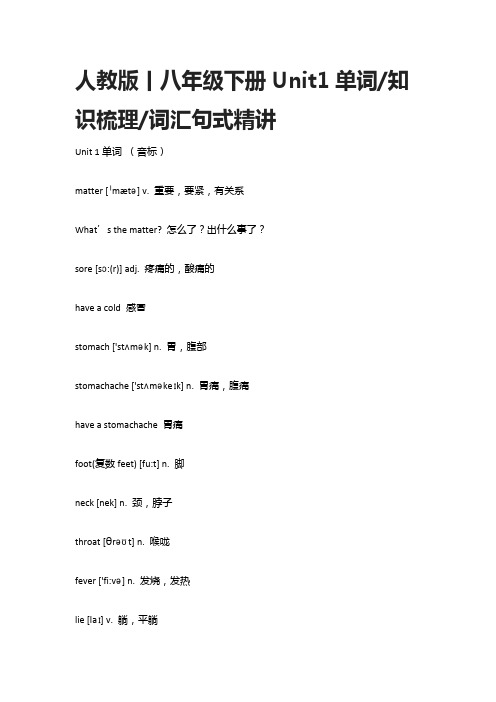
人教版丨八年级下册Unit1单词/知识梳理/词汇句式精讲Unit 1单词(音标)matter [ˈmætə] v. 重要,要紧,有关系What’s the matter? 怎么了?出什么事了?sore [sɔ:(r)] adj. 疼痛的,酸痛的have a cold 感冒stomach ['stʌmək] n. 胃,腹部stomachache ['stʌməkeɪk] n. 胃痛,腹痛have a stomachache 胃痛foot(复数feet) [fu:t] n. 脚neck [nek] n. 颈,脖子throat [θrəʊt] n. 喉咙fever ['fi:və] n. 发烧,发热lie [laɪ] v. 躺,平躺lie down 躺下rest [rest] n. 剩余部分,其余;放松,休息cough [kɒf] n. & v. 咳嗽X-ray ['eksreɪ] n. X光,X射线toothache [ˈtu:θeɪk] n. 牙痛take one's temperature 量体温headache [ˈhedeɪk] n. 头痛have a fever 发烧break [breɪk] n. & v. 休息,暂停;打破take breaks (take a break)休息hurt [hə:t] v. 伤害,损害,使受伤,疼passenger ['pæsɪndʒə] n. 乘客,旅客off [ɒf] adv. prep. 离开(某处);从…去掉get off 下车to one's surprise 使…惊讶,出乎…意料onto [ˈɒntə] prep. 向,朝trouble [ˈtrʌbl] n. 麻烦,烦扰,问题hit [hit] n. & v. 碰撞,打,打击right away 立即,马上get into 陷入,参与herself [hə:ˈself]她自己,她本身(she的反身代词)bandage ['bændɪdʒ] n. & v. 绷带;用绷带包扎sick [sɪk] adj. 患病的,不适的knee [ni:] n. 膝盖nosebleed [ˈnəʊzbli:d] n. 鼻出血breathe [bri:ð] v. 呼吸sunburned [ˈsʌnbɜ:nd] adj. 晒伤的ourselves [ɑ:ˈselvz]我们自己(we的反身代词)climber [ˈklaɪmə(r)] n. 登山者be used to 习惯于…适应于…risk [rɪsk] n. & v. 风险,危险;冒险take risks (take a risk) 冒险accident [ˈæksidənt] n. 意外事件;事故situation [ˌsitjuˈeiʃən] n. 状况,形式,情况kg=kilogram [ˈkɪləgræm] n. 公斤,千克rock [rɔk] n. 岩石run out (of) 用尽,耗尽knife [naif] n. 刀,餐刀cut off 切除blood [blʌd] n. 血mean [mi:n] v. 意味着,意思是,意欲get out of 离开,从…出来importance [ɪmˈpɔ:tns] n. 重要性decision [dɪ'sɪʒn] n. 决心,决定,抉择control [kən'trəʊl] v. 控制,支配,操纵be in control of 掌管,管理spirit ['spɪrɪt] n. 勇气,意志death [deθ] n. 死亡give up 放弃nurse [nə:s] n. 护士Judy 朱迪(女名)Nancy 南希(女名)Mandy 曼迪(女名)Aron Ralston 阿伦·罗尔斯顿Utah 尤他州(美国)知识梳理【重点单词】matter [ˈmætə] v. 重要,要紧,有关系What’s the matter? 怎么了?出什么事了?sore [sɔ:(r)] adj. 疼痛的,酸痛的have a cold 感冒stomach ['stʌmək] n. 胃,腹部stomachache ['stʌməkeɪk] n. 胃痛,腹痛have a stomachache 胃痛foot(复数feet) [fu:t] n. 脚neck [nek] n. 颈,脖子throat [θrəʊt] n. 喉咙fever ['fi:və] n. 发烧,发热lie [laɪ] v. 躺,平躺lie down 躺下rest [rest] n. 剩余部分,其余;放松,休息cough [kɒf] n. & v. 咳嗽X-ray ['eksreɪ] n. X光,X射线toothache [ˈtu:θeɪk] n. 牙痛take one's temperature 量体温headache [ˈhedeɪk] n. 头痛have a fever 发烧break [breɪk] n. & v. 休息,暂停;打破take breaks (take a break)休息hurt [hə:t] v. 伤害,损害,使受伤passenger ['pæsɪndʒə] n. 乘客,旅客off [ɒf] adv. prep. 离开(某处);从…去掉get off 下车to one's surprise 使…惊讶,出乎…意料onto [ˈɒntə] prep. 向,朝trouble [ˈtrʌbl] n. 麻烦,烦扰,问题hit [hit] n. & v. 碰撞,打,打击right away 立即,马上get into 陷入,参与herself [hə:ˈself] pron. 她自己,她本身(she的反身代词)bandage ['bændɪdʒ] n. & v. 绷带;用绷带包扎sick [sɪk] adj. 患病的,不适的knee [ni:] n. 膝盖nosebleed [ˈnəʊzbli:d] n. 鼻出血breathe [bri:ð] v. 呼吸sunburned [ˈsʌnbɜ:nd] adj. 晒伤的ourselves [ɑ:ˈselvz] pron. 我们自己(we的反身代词)climber [ˈklaɪmə(r)] n. 登山者be used to 习惯于…适应于…risk [rɪsk] n. & v. 风险,危险;冒险take risks (take a risk) 冒险accident [ˈæksidənt] n. 意外事件;事故situation [ˌsitjuˈeiʃən] n. 状况,形式,情况kg=kilogram [ˈkɪləgræm] n. 公斤,千克rock [rɔk] n. 岩石run out (of) 用尽,耗尽knife [naif] n. 刀,餐刀cut off 切除blood [blʌd] n. 血mean [mi:n] v. 意味着,意思是,意欲get out of 离开,从…出来importance [ɪmˈpɔ:tns] n. 重要性decision [dɪ'sɪʒn] n. 决心,决定,抉择control [kən'trəʊl] v. 控制,支配,操纵be in control of 掌管,管理spirit ['spɪrɪt] n. 勇气,意志death [deθ] n. 死亡give up 放弃nurse [nə:s] n. 护士【重点短语】1.have a fever 发烧2.have a cough 咳嗽3.have a toothache 牙疼4.talk too much 说得太多5.drink enough water 喝足够的水6.have a cold 受凉;感冒7.have a stomachache 胃疼8.have a sore back 背疼9.have a sore throat 喉咙痛10. take risks 冒险11.hot tea with honey 加蜂蜜的热茶12.see a dentist 看牙医13.get an X-ray 拍X 光片14.take one’s temperature 量体温15.put some medicine on sth. 在……上面敷药16. give up 放弃17. sound like 听起来像18. all weekend 整个周末19. in the same way 以同样的方式20. go to a doctor 看医生21. go along 沿着……走22. on the side of the road 在马路边23. shout for help 大声呼救24. without thinking twice 没有多想25. get off 下车26. have a heart problem 有心脏病27. to one’s surprise 另某人惊讶的是28. thanks to 多亏了;由于29. in time 及时30. make a decision 做出决定31. get into trouble 造成麻烦32. right away 立刻;马上33. because of 由于34. get out of 离开;从……出来35. keep on doing sth. 继续或坚持做某事36. put a bandage on sth. 用绷带包扎37. fall down 摔倒38. feel sick 感到恶心39. have a nosebleed 流鼻血40. cut his knee 割伤他的膝盖41. put her head back 把她的头向后仰42. have problems breathing 呼吸困难43. mountain climbing 登山运动44. be used to doing sth. 习惯做某事45. run out (of) 用完;用尽46. so that 以便47. so...that... 如此……以至于...…48. be in control of 掌管;管理49. in a difficult situation 在闲境中【重点句型】1. What's the matter with you?= What'the trouble with you?= What's wrong with you? 你怎么了?2. What should she do? 她该怎么办呢?3.Should I take my temperature? 我应该量一下体温吗?4.You should lie down and rest. 你应该躺下休息一会儿。
英语八年级下册-Unit1课件(含答案)
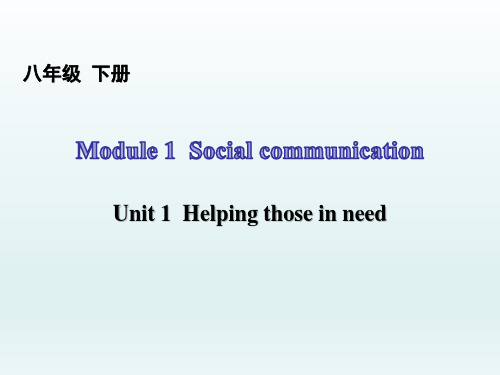
To _5__, many students looked for part-time jobs and saw how hard life was. Some made use of their talents __6__ singing and dancing in parks or shopping malls.
四、完形填空 If you are given only 1 yuan, can you live in a city for
one day? It may be a little difficult. But the ___1___ from Xi’an did it.
On 10 April, more than 60 students from a middle school ___2___ the One Yuan Metropolis(大都市) Survival. The charity for teenagers called Imperceptible (无法察觉的) Education held this ___3___. Students not only had to live,but they also had to deal with a lot of ___4___ tasks.
( B )5. —We will succeed if we continue studying hard.
—Yes. I agree with you.
A. start
B. go on
C. stop
( C )6. —Did your parents pay the money for your new
—Yes. I agree with you.
八年级英语下册Unit1 知识梳理(重要句型、重点单词、短语解析及练习)

八年级英语下册Unit1 知识梳理(重要句型、重点单词、短语解析及练习)课文翻译:Section A 会话Role-play the conversation. 角色扮演对话。
Lisa, are you OK? 丽莎,你还好吗?I have a headache and I can't move my neck. 我头痛,我的脖子不能动了。
What should I do? 我头痛,我的脖子不能动了。
Should I take my temperature? 我应该测测体温吗?No, it doesn't sound like you have a fever. 不,你看起来不像是发烧了。
What did you do on the weekend? 你周末做什么了?I played computer games all weekend. 我整个周末都在玩电脑游戏。
That's probably why. 这可能就是你头痛的原因了。
You need to take breaks away from the computer. 你需要休息并且远离电脑。
Yeah, I think I sat in the same way for too long without moving. 是的,我想我是因为以同样的姿势坐的太久没有动。
I think you should lie down and rest. 我想你应该躺下休息。
If your head and neck still hurt tomorrow, then go to a doctor. 如果明天你的头部和颈部还疼,再去看医生。
OK. Thanks, Mandy. 好。
谢谢你,曼蒂。
Section A 短文Read the passage. 阅读下面的短文。
Do you think it comes from a newspaper or a book? 你认为这篇短文是出自一份报纸还是一本书?How do you know? 你是怎么知道的?Bus Driver and Passengers Save an Old Man 公交车司机和乘客救了一位老人At 9:00 a.m. yesterday, bus No. 26 was going along Zhonghua Road when the driver saw an old man lying on the side of the road. 在昨天上午9点,当司机看到一位老人躺在路边,26路公交车正在沿中华路行驶。
- 1、下载文档前请自行甄别文档内容的完整性,平台不提供额外的编辑、内容补充、找答案等附加服务。
- 2、"仅部分预览"的文档,不可在线预览部分如存在完整性等问题,可反馈申请退款(可完整预览的文档不适用该条件!)。
- 3、如文档侵犯您的权益,请联系客服反馈,我们会尽快为您处理(人工客服工作时间:9:00-18:30)。
八年级下Unit 1练习02一单项选择题( ) 1. What’s ______? --I have ______.A. matter, feverB. the matter, a feverC. matter, feversD. a matter, a fever ( ) 2. I think walking is________ our health.A. good atB. bad atC. well inD. good for( ) 3. We should not eat________ junk food.A. too manyB. too muchC. many tooD. much too ( ) 4. It’s important _____ health y.A. stayB. stayingC. to stayD. stays( ) 5. He often plays sports, ______ , running, swimming and ping-pong.A. for an exampleB. for examplesC. for exampleD. for the example ( )6 —I am kind of _____. Would you please give me something to drink? —Of course.A. happyB. thirstyC. hungryD. angry( ) 7. –I have a fever. ---_____________A. I think so.B. That's OK.C. Really?D. I am sorry to hear that. ( ) 8. He isn't at home ____.A. at momentB. the momentC. at the momentD. for the moment ( ) 9. She never _______ tea ________ coffee.A. drink; andB. doesn’t drink; orC. drinks; orD. drink; with ( ) 10. Tony ______.A. is stress outB. stress outC. is stressed out D stressed out ( ) 11. You shouldn’t eat _____ 24 hours.A. something, inB. nothing, forC. anything, forD. everything, at ( ) 12. Brian doesn’t like __________ .A. readingB. readC. readsD. readed( )13. ---You are stressed out. You should listen to some music.---That __________ a good idea.A. soundsB. sounds likeC. likeD. sound like ( )14. I have a lot of _____.A. headachesB. headacheC. the headacheD. a headache ( )15. ----How are you? -----____________.A. I’m n ot feel well.B.I don’t feeling wellC. I’m not feeling wellD.I don’t feel good( ) 16. They enjoy_______ music every day.A. listenB. listeningC. listening toD. to listen ( )17.--Do you think I should help him? --Yes, I think____.A. soB. itC. noD. too( )18. I didn’t understand the whole thing_______she told me the secret.A. untilB. whenC. afterD. Because( )19. You look pale. You _____ see the doctor.A. shouldB. have toC. do D can( ) 20. You should drink hot tea ________ honey.A. inB. withC. ofD. at二.完形填空:What should we do to keep healthy? One important ruleis to exercise 1 . The Fang families try to exercise every day. Mr. Fang 2 exercise in the morning because he must go to work at seven o'clock. But he runs every evening. He walks a lot, 3. He walks to school every day, and after school he _4_ different sports with his friends. Mr Fang goes to a yoga (瑜加功)class__5__. But it wasn't__ 6__this way. Last year Mr. and Mrs. Fang used to_7__everywhere in their car, even to the drugstore(药店)two blocks away. They thought they had to use the car all the time. They wouldn't walk.The Fangs all__8__better now. They believe they shouldn't be lazy. We__9__exercise every day, but we should try our__10__to exercise as often as possible.( ) 1. A. often B. sometimes C. late D. later( ) 2. A. may not B. can not C. would not D. should not( ) 3. A. either B. also C. too D. again( ) 4. A. watches B. plays C. loves D. likes( ) 5. A. in two weeks B. for two weeks C. after two weeks D. twice a week( ) 6. A. always B. even C. sometimes D. no( ) 7. A. riding B. drive C. fly D. walk( ) 8. A. had B. make C. feel D. feel like( ) 9. A. needn't B. don't C. won't have D. mustn't( ) 10. A. best B. good C. well D. betterBOne day a poor man was traveling on horseback. At noon, he tied his horse to a tree and then 1 to eat something. A few minutes later, a rich man came along and tied his horse to the same tree.―Please tie your horse to another tree,‖ said the poor man. ―My horse is wild. It will kill yours.‖2 the rich man said, ―I shall tie my horse as I like!‖ he tied up his horse and had his lunch nearby. After a moment they heard a terrible3 , the two horses were fighting. They went up to them, but it was too4 . The rich man’s horse was killed. ―See what you horse has done!‖ cried the rich man. ―You will have to5 it.‖ And he brought the poor man before Mr. Know.Mr. Know asked the poor man some questions. But he made no 6 . At last Mr. Know said, ―This man is dumb. He cannot speak.‖―Oh,‖ the rich man shouted 7 . ―He can! He spoke to me when I met him.‖―Are you sure?‖ asked Mr. Know. ―What did he 8 ?‖―He told me not to tie my horse to the same tree because his horse was wild and would kill my horse.‖―Oh,‖ said Mr. Know. ―So he 9 you. Then can you expect to get money 10 him?‖The rich man said nothing and left silently.1. A. put down B. set down C. sat down D. turned down2. A. So B. But C. And D. Though3. A. song B. word C. bell D. noise4. A. late B. slow C. hard D. quick5. A. pay for B. look for C. wait for D. care for6. A. idea B. mistake C. money D. answer7. A. quietly B. angrily C. happily D. heavily8. A. speak B. tell C. talk D. say9. A. helped B. thanked C. warned D. ordered10. A. for B. from C. with D. about 三.阅读理解AA great French writer has said that we should help everyone as much as we can because we often need help ourselves. The small even can help the great. About this, he told the following story.An ant was drinking at a small river and fell in. she tried her best to reach the side, but she couldn’t move at all. The poor ant got too ti red but was still doing her best when a big bird saw her. With a pity, the bird threw a piece of wood. With it the ant reached the bank again. While she was resting and drying herself in grass she heard a man coming up. He was walking without shoes on his feet and carrying a gun in his hand. As soon as he saw the bird, he wished to kill her, and he would certainly do so, but the ant bit(咬) him in one of his feet and at that moment the bird flew away at once. It was an animal much weaker and smaller than the bird herself that had saved her life.1. According to the French writer, we often need help from others, so we should _____.A. help others as much as we canB. help the people who may be useful to usC. get as much help as we canD. first need to help ourselves2. Why could the bird fly away at once?A. Because the bird could fly very fast.B. Because the man hurt his feet himself.C. Because the man didn’t want to kill her.D. Because the ant bit the man in one of his feet.3. An ant fell in the river and could not reach the side because _____.A. she didn’t try toB. she wanted to swim in the riverC. she didn’t cry for helpD. she wasn’t able to move in the water4. The writer tells this story to show _____.A. how brave the bird isB. even the small can help the greatC. how an ant saved a birdD. how clever the ant is5. The title of this story can be ―_____‖.A. The AntB. PityC. HelpD. The BirdBWhen you are ill, you should go to see a doctor. After the doctor looks you over, he will write you a note to take to the chemist for some medicine. Chemists are usually good at reading doctors’ notes. But sometimes doctors write too badly and even the chemist can not read them.One day a woman wrote to a doctor to invite him to have dinner with her family in the restaurant. The doctor wrote an answer, but he wrote too badly and the woman could not read it. ―What shall I do?‖ she asked her husband, ―I don’t know whether he is going to come or not. I don’t want to call and say that I don’t understand him.‖Her husband thought for a few minutes and then he had an i dea. ―Take it to the chemist,‖ he said, ―He will be able to read it for us.‖―Thank you,‖ the woman said, ―That’s a good idea.‖ She went to the chemist’s shop and gave the doctor’s note to him. The chemist looked at it for a long time.―Could you wait a moment, Miss?‖ he said, Then he went to the back of the shop. After a few minutes he came back, carrying a large bottle. He gave the bottle to the woman.―Take one spoonful(一匙) every day.‖ He told the woman.6. What did the doctor do when he was invited to have dinner in the restaurant?A. He said he could come on timeB. he wrote the woman an answerC. he was very glad to comeD. He wrote a note to the chemist7. Why couldn’t the woman understand the ―note‖?A. Because the doctor wrote badly.B. Because the woman didn’t know much about medicine.C. Because the doctor didn’t like to goD. Because the woman never went to school.8. The husband wanted his wife to _______.A. call the doctor or have dinner with them.B. go to the chemist and get some medicine.C. take the reply to the chemist for helpD. read it again9. In the story, the word ―chemist‖ means ―______’ in Chinese.A. 护士B. 化验师C. 药剂师D.药房10. What did the man in the chemist’s shop give the woman at last?A. A piece of good advice.B. The right idea of the doctor.C. An invitation from the doctor.D. A bottle of medicine.三.短文填词Bob lived in a small town. Later, he got a job in a big city so he had to m 1 there with his wife and two children.O 2 the first Saturday in their new home. Bob t__3 his new red car out of the garage(车库). He was w 4 it when a neighbor came by.When he saw Bob’s car, the neighbor stoppedand looked at it for a m 5 . Then Bob t 6 and saw him.The neighbor said, ―That's a nice car. Is it yours?‖"Sometimes" Bob answered.The neighbor was puzzled. "Sometimes?" he said, "What do you m__7__?‖Bob answered s __8 ,"Well, when there's a party in town, it belongs to my daughter. When there's a football game somewhere, it belongs to my son. When I've washed it, and it looks really nice and c__9 , it belongs to my wife. And when it is d 10 , it's mine."。
